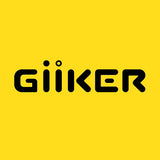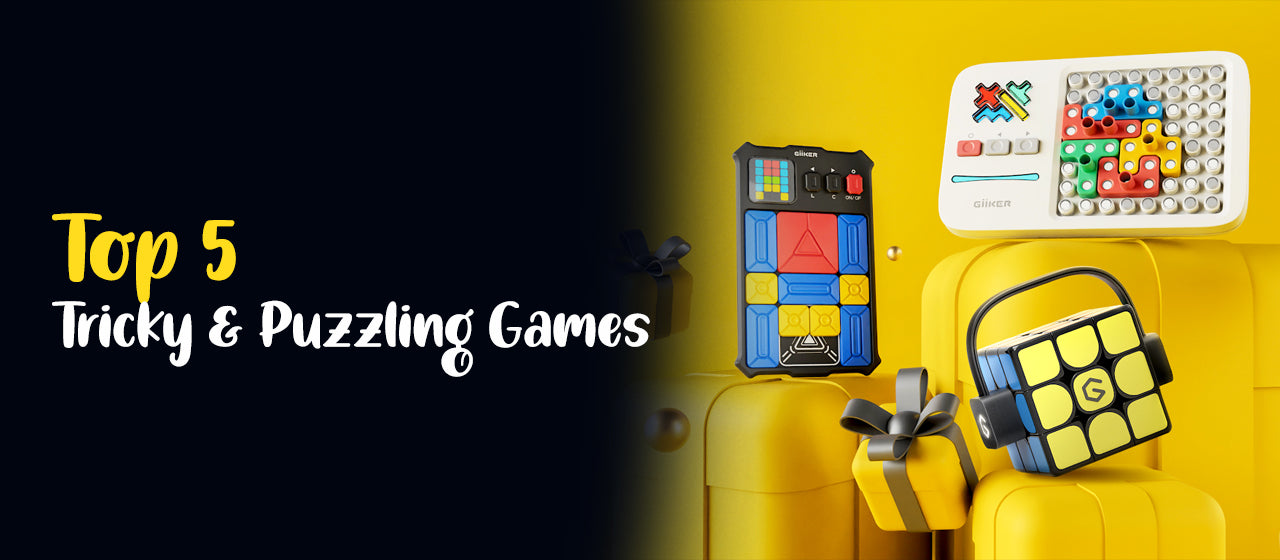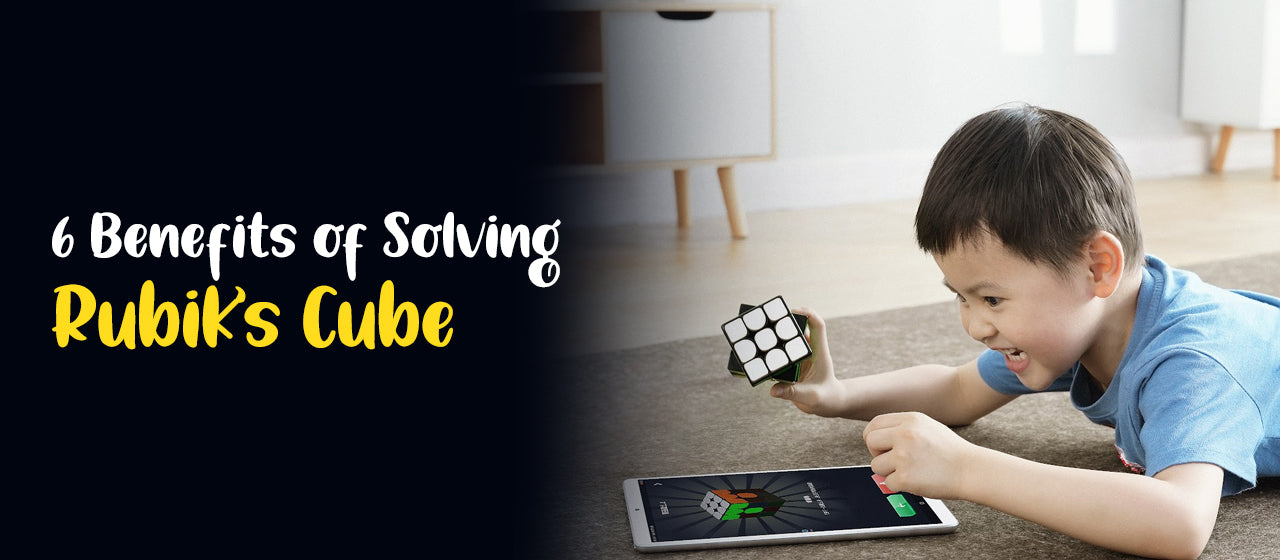The world of puzzles and brain teasers has long fascinated individuals seeking to test and expand their intellectual capacities. Rubik's Cubes, with their colorful squares and complex algorithms, have been a staple in this realm for over four decades. Cubing, as it is commonly known as memory games for kids. It is a unique hobby that challenges individuals to solve this iconic 3D puzzle in the shortest time possible. While it may appear to be just a recreational activity, cubing has an intriguing relationship with intelligence, problem-solving skills, and cognitive development.
In this blog, we will explore the connection between cubing and smartness, cognitive benefits of solving Rubik's Cubes, the role of practice and perseverance, and the impact on one's overall intellectual abilities.
The Cognitive Benefits of Cubing

Cubing is not just a pastime; it is a mental exercise that offers a wide range of cognitive benefits. When we talk about the relationship between cubing and smartness, we need to understand how solving Rubik's Super Cubes can positively impact various aspects of intelligence.
Spatial Intelligence:
Solving a Rubik's Cube is a spatial puzzle and a brain game for kids. It requires an understanding of how the different pieces move and fit together in three dimensions. This promotes the development of spatial intelligence, which is the ability to visualize, manipulate, and understand spatial relationships between objects. People with strong spatial intelligence tend to excel in fields like architecture, engineering, and mathematics. Cubing provides an opportunity to enhance this important cognitive skill.
Problem-Solving Skills:

Cubing is all about problem-solving and memory game for kids. To solve the puzzle, cubers must analyze the current state of the cube, devise a strategy, and execute a series of moves to reach the solution. This iterative problem-solving process improves one's ability to approach complex problems logically and systematically, a valuable skill in both academic and real-world scenarios.
Concentration and Patience:
Cubing requires intense concentration and patience. Speed cubers, individuals who aim to solve the cube as quickly as possible, must stay focused and maintain precision throughout their solve. The practice of maintaining focus and composure under pressure not only improves one's cubing skills but also their ability to concentrate on tasks and remain patient in the face of challenges.
Memory Enhancement:
To solve the cube efficiently, cubers must memorize various algorithms and sequences of moves. This memory games for kids enhances their working memory, the cognitive system responsible for temporarily storing and manipulating information. A robust working memory is essential for tasks like learning new information, problem-solving, and multitasking.
Pattern Recognition:
Solving the Rubik's Cube involves recognizing and manipulating specific patterns. Developing pattern recognition skills is essential in a variety of fields, including mathematics, computer science, and chess. Cubing cultivates the ability to identify and exploit patterns, which can be applied to other areas of life.
Practice and Perseverance
While the cognitive benefits of cubing are evident, it's important to note that these advantages are not immediate. Cubing, like any skill, requires practice and perseverance to fully reap the rewards. The relationship between cubing and smartness becomes clearer when we consider the role of dedication and effort in the journey of becoming a proficient cuber.
Mastery through Repetition:
Cubing is a pursuit that demands repetition. Solving the Rubik's Cube efficiently is about committing various algorithms and techniques to muscle memory as it is one of the best memory games for kids. Speed cubers solve the cube repeatedly, aiming to reduce their solve times through countless iterations. This dedication to practice mirrors the process of mastering any intellectual skill.
Incremental Improvement:
Cubing fosters the idea of incremental improvement. As cubers solve the cube over and over, they notice gradual enhancements in their solve times and problem-solving skills. This concept of continuous, incremental progress is a fundamental aspect of smartness. Intelligence is not fixed; it can be developed and improved with consistent effort.
Problem-Solving Transfer:
The problem-solving skills acquired through cubing can transfer to other aspects of life. A cuber who becomes skilled in algorithmic thinking may apply this mindset to tackle challenges in academics or professional endeavours. The ability to approach problems systematically, break them down into manageable components, and devise effective strategies is a hallmark of smartness.
Resilience and Perseverance:
Cubing is not without its moments of frustration and setbacks. Speedcubers often face barriers when trying to improve their solve times, and it can be discouraging. However, the perseverance required to overcome these obstacles reflects a characteristic of intelligent individuals. Smartness is not just about initial aptitude but also about the determination to overcome obstacles and continue learning.
Impact on Overall Intellectual Abilities
Cubing, as a challenging intellectual pursuit, can have a significant impact on one's overall intellectual abilities. The relationship between cubing and smartness extends beyond just the specific cognitive benefits and the need for practice. It can enhance one's intellectual capacity in broader ways.
Confidence and Self-Efficacy:
As individuals progress in their cubing skills, they experience a boost in confidence and self-efficacy. They have tangible evidence of their problem-solving abilities and intellectual growth, which can positively affect their outlook on academic or professional challenges. This enhanced self-assuredness can lead to a more proactive approach to learning and problem-solving.
Analytical Thinking:

Cubing encourages analytical thinking. Speedcubers must evaluate their solves critically, identifying where they can improve and refining their strategies. This analytical mindset is valuable not only in cubing but also in approaching complex academic subjects and real-world problems.
Cognitive Flexibility:
Solving a Rubik's Cube involves adapting to various situations, adjusting strategies, and considering multiple possibilities. This nurtures cognitive flexibility, the ability to switch between different tasks and thought processes effectively. Cognitive flexibility is a hallmark of smartness and one of the memory games for kids, allowing individuals to adapt to changing circumstances and think creatively.
Metacognition:
Cubing promotes metacognition, the awareness and understanding of one's own thought processes. Cubers often reflect on their solving techniques, identifying areas for improvement and fine-tuning their approach. Metacognition is a critical aspect of intelligence, enabling individuals to monitor and regulate their thinking, which can be applied to academic and professional growth.
Relationship between Cubing And Smartness
The relationship between cubing and smartness is multifaceted and intriguing. While cubing is memory games for kids often seen as a recreational hobby, it offers significant cognitive benefits that can enhance intelligence, problem-solving skills, and overall cognitive abilities. These benefits extend to spatial intelligence, problem-solving skills, concentration, patience, memory enhancement, and pattern recognition. However, the true value of cubing lies not only in these cognitive advantages but also in the process of practice and perseverance.
Cubing necessitates dedication, practice, and continuous improvement. The incremental progress that cubers experience mirrors the journey of mastering any intellectual skill, reflecting the concept that intelligence is not static but can be cultivated through effort and determination. The problem-solving skills developed through cubing can transfer to other areas of life, enhancing one's analytical thinking, cognitive flexibility, and metacognitive abilities.
Ultimately, cubing can have a profound impact on one's overall intellectual abilities, including confidence, analytical thinking, cognitive flexibility, and metacognition. The relationship between cubing and smartness is not just about solving a colorful puzzle but about nurturing a mindset of continuous learning, resilience, and adaptability.
Cubing is a testament to the idea that intelligence is not solely determined by one's innate abilities but can be shaped and expanded through focused effort and a willingness to confront challenges head-on. So, next time you see someone solving a Giiker’s SuperCube, remember that they might be cultivating their smartness in ways you might not expect.



